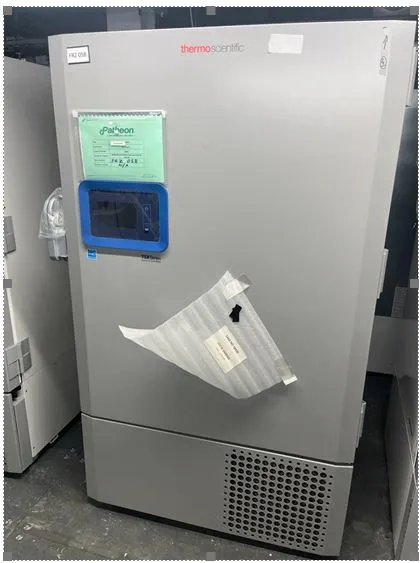Find a wide selection of laboratory Freezers for long-term storage of biological samples, reagents, and temperature-sensitive materials. Explore options from top brands like Thermo Fisher Scientific, Eppendorf, and Panasonic. Ideal for research, clinical, and industrial labs.
Freezers
Price Filter
$0.00 - $450,000.00Product Region
Product Condition
Product Warranty
Browse By Category

Thermo Scientific TSX Series Ultra-Low Freezer, 230V, 50Hz - TSX70086V

Thermo Scientific TSX70086V Ultra-Low Freezer, 33.5 cu. ft., 949 L, -50C to -86C, 230V

Thermo Scientific TSX Series Ultra-Low Freezer TSX70086V 230V 50Hz - 33.5 cu. ft.

Thermo Scientific TSX Series Ultra-Low Freezer TSX70086V, 700-Box Capacity, 949 L, -50C to -86C, 230V, 50Hz

Thermo Scientific TSX Series Ultra-Low Freezer TSX70086V - 230V, 50Hz

Thermo TSX70086V Ultra-Low Freezer, 230V, 700-Box Capacity, -50C to -86C

Thermo Scientific TSX Series Ultra-Low Freezer - TSX70086V - 949 L Capacity

Thermo Scientific TSX Series Ultra-Low Freezer TSX70086V - 230V, 50Hz

Thermo Scientific TSX Series Ultra-Low Freezer TSX70086V - 700 Box Capacity

Thermo Scientific TSX Series Ultra-Low Freezer TSX70086V - 230V, 50Hz
Question & Answers For:
Freezers
Past Questions, Helpful Answers.
What types of materials can be stored in these freezers?
These freezers are designed to store biological samples, reagents, and temperature-sensitive materials such as proteins, enzymes, DNA/RNA, and vaccines. They are ideal for long-term storage in research, clinical, and industrial laboratories.
What is the ideal temperature range for these freezers?
Laboratory freezers typically have temperature ranges between -10°C and -86°C, depending on the model. This ensures optimal storage conditions for various biological materials.
Are these freezers energy efficient?
Yes, laboratory freezers are built to be energy-efficient while maintaining a stable temperature. Many models are designed with advanced insulation and low energy consumption features to minimize running costs.
How do I maintain the temperature inside the freezer?
Maintaining the temperature in a laboratory freezer is largely automated, with advanced temperature control systems and alarms to alert you in case of fluctuations. Regular monitoring and calibrating temperature sensors ensure consistent performance.
Can I store different types of samples in the same freezer?
Yes, you can store different types of samples in the same freezer, provided they have similar temperature requirements. It is essential to organize them in separate containers or racks to avoid cross-contamination.
Do these freezers have a backup power system?
Many laboratory freezers come with built-in alarms to alert you of power failure or temperature changes. Some models are compatible with external backup power systems or UPS to maintain temperature during power outages, ensuring the safety of stored materials.
How easy is it to clean these freezers?
Cleaning laboratory freezers is simple, with most models having smooth, easy-to-wipe surfaces. For optimal hygiene, regular defrosting and cleaning of the interior and seals are recommended, based on the manufacturer's guidelines.
Are these freezers designed for continuous use?
Yes, these laboratory freezers are designed for continuous use in a lab environment. They are built to run 24/7, offering reliable long-term storage without compromising temperature stability.
Do I need to install these freezers, or can they be set up easily?
Most laboratory freezers are designed for easy setup. They typically come pre-assembled and require minimal installation. Just plug them in, calibrate the temperature settings, and they’re ready for use.
How long do these freezers typically last?
With proper maintenance, laboratory freezers can last for many years. The lifespan typically ranges between 10 to 15 years, depending on the brand, model, and usage.